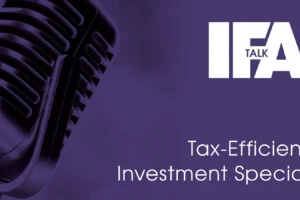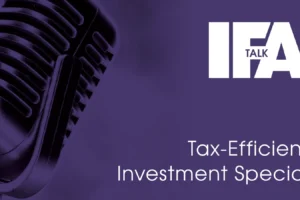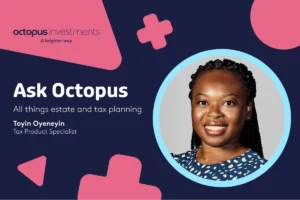In a recent Tax-Efficient Investment (TEI) special edition of IFA Magazine’s weekly podcast, IFA Talk, we welcomed Triple Point’s Diana French into the studio. Diana is the Chief Commercial Officer for Retail Distribution at Triple Point, and she joined us to dive into the topic of tax-efficient planning, during a time of rising taxes.
With taxes on the rise, new rules bringing pensions into the inheritance tax net, and clients increasingly looking to advisers for clarity, the landscape seems to be getting more challenging as time goes on. But it’s also a time of real opportunity for advisers to demonstrate their value to clients, and Diana talks us through what this looks like in practice.
Tax makes the headlines
The fact that tax remains headline news comes as no surprise to Diana, considering that we’re seeing some of the highest tax rates since 1949, while the number of higher-rate taxpayers has increased exponentially in recent years. “There are nearly four times as many higher-rate taxpayers now than there were 30 years ago,” Diana explained. “In the last three years, the number of people paying additional l-rate tax has doubled.”
Inheritance tax has also faced some big changes in lieu of the autumn budget last year. Diana recapped what has changed, noting that the nil rate band and the residence nil rate band are frozen until 2030. “If we put that into context, the nil rate band has been frozen since 2009,” Diana said. “If it had risen in line with inflation, it would be worth over £500,000 today, which is why we’re seeing more and more clients fall into paying inheritance tax.”
Let’s talk about pensions…
Diana noted that the biggest change following the budget has come to pensions. From April 2027, unspent pension pots will fall into scope from inheritance tax, which Diana said has shifted the way people approach the topic of pensions.
Diana revealed that there has been a significant increase in inquiries about what clients should be doing with their pensions. “There has been a lot of change, but this brings a really big opportunity for financial advisers who play such a crucial role with their clients,” she stated. “They are needed now more than ever in terms of inheritance tax planning and pension planning.”
Budget brings business relief changes
Another area which has seen major changes is business relief. “We saw a new £1 million allowance at a 100% rate of relief for qualifying businesses, with anything over that attracting a 50% rate of relief,” Diana noted. “In other words, the first £1 million faces no inheritance tax.”
AIM shares were also met with big changes. “There is just a flat 50% rate of relief, no matter how much is held within AIM shares or BR-qualifying AIM shares,” Diana pointed out.
Business Relief shares need to be held for a minimum of two years, and they need to be held at the time of death in order to qualify for BR. From April 2026, the first £1 million of BR-qualifying shares will receive the 100% rate of relief as long as they are from an unquoted or privately held company.
Diana concluded, “I always think of BR as an investment that happens to qualify for a tax relief. It’s a great option for those clients who are willing to take additional risks with their money.”
But what about gifting?
Diana moved on to the topic of gifting, noting that it is another good option for the right client. With gifting, you see an immediate benefit for the recipient. “You may get to see them buy their house or go to university,” Diana suggested. “However, it takes seven years for that gift to become efficient for IHT, and once that gift has been made, you can’t ask for it back.” With Business Relief investments, the value can usually be passed on free of inheritance tax after just two years, as long as you still hold them when you die. This is much quicker than most gifting strategies, which, as mentioned above, normally take seven years to achieve the same result.
Triple Point are having an increasing number of conversations about inheritance tax. Diana referred to it as a real hot topic, adding that a high number of clients are focusing heavily on inheritance tax in light of recent developments.
How new IHT rules are shaping conversations
Diana noted that the new IHT rules have had a serious knock-on effect for advisers in recent years. “I have a lot of empathy for financial advisers at the moment”, she said. “There’s been so much change, not just with the budget, but also a lot of regulatory change over the last few years as well.”
The budget itself has created a seismic change for advisers, according to Diana, with every client who had previously undergone IHT planning now needing to revisit it. Diana provided an example, where a married couple with an estate of £1 million along with £1 million in pensions would now be forced to reconsider their plans. “Before April 2027, those pensions won’t fall into scope for inheritance tax,” she advised. “However, the IHT situation is looking quite different post-April 2027, meaning all the planning needs to be revisited.”
She also noted that pensions have faced uncertainty, with advisers still navigating the range of changes. “We’re starting to see a shift in the thought process towards pensions,” she explained. “Historically, you’d touch your pensions last and look at your other assets first because of the IHT benefits, but advisers are starting to rethink this process.”
The role of VCTs in the wider tax planning toolkit
Readers of TEI Magazine will no doubt be all too familiar with VCTs, but we asked Diana to outline what role VCTs will play as investment strategies transform to accommodate recent changes.
Diana explained that the amount invested into the VCT up to £200,000 in a tax year has up to 30% upfront income tax relief, which a client can claim. She made a point of noting that clients cannot claim more than they’ve paid.
However, Diana revealed that certain allowances have been seriously affected in recent years, namely the CGT and dividend allowances. “We’ve seen CGT be halved and then halved again, down to £3,000,” she stated. “We’ve seen the dividend allowance go from £2,000, to £1,000 to £500.” As a result of this, clients are now considering where they can get tax-efficient income from.
Diana added that she believes clients hold a highly positive view of VCTs, in that they back many of Britain’s brightest companies with high-growth potential. “Not all will be successful, but quite a few will,” she clarified. “It is tremendous to see the growth of those companies, and the impact they have on the British economy as well.”
Want to hear more?
To access Diana’s full podcast IFA Talk episode, head to the website where you listen and get all the details first-hand.















